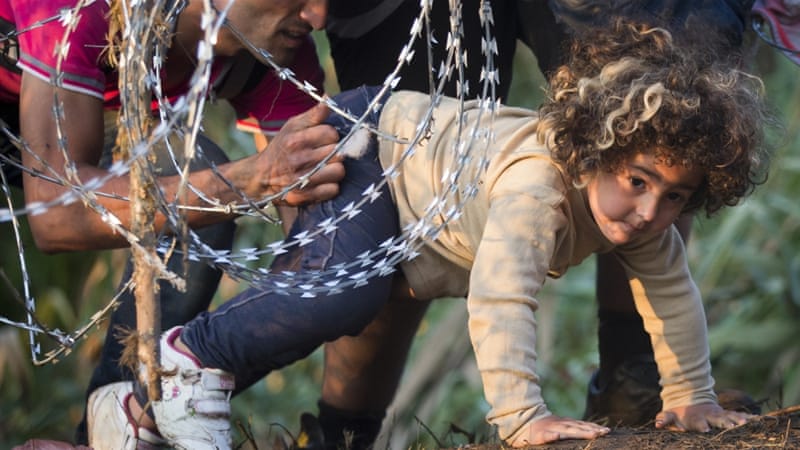Lava Jato, barragem de Mariana
e fuga dos imigrantes. Toda noite é isso que se vê nos noticiários. Não sei se
os jovens assistem a esses horrores. Eu assisto e me incomodo muito,
principalmente com aquela foto do garotinho sírio que morreu afogado na praia.
Por isso, vou abordar esse assunto, propondo alguns exercícios, baseados no
texto que se segue.
The 4 Big Questions About Europe’s Migrant Crisis
(adapted)
·
By Naina Bajekal Sept.
9, 2015 in time.com

In recent weeks, _______ at _______ crossings and train stations, squalid conditions in ________ refugee camps and a ________ photograph of a _______ Syrian _______ have all helped bring Europe’s refugee crisis into the
global spotlight. According to the UNHCR (United Nations High Commissioner for Refugees), more than 380,000 migrants and refugees have _______ on Europe’s southern ________
_______ this year, up from
216,000 arrivals in the whole of 2014. They are _______ persecution, _______
and conflicts that _______ _______
the continent’s borders, but not all ________
to reach safety – this year alone, 2,850 people have drowned in the
Mediterranean. That hasn’t stopped people making desperate bids to reach Europe,
________. Here’s what to know about
why the continent is facing one of its toughest ________ in decades.
1.
Complete os espaços do parágrafo acima com as palavras do seguinte
box:
heartbreaking – rage – chaos – beyond – shores –
so far – border – fleeing – toddler – challenges – makeshift – poverty –
drowned – though – landed - manage
1. What’s the difference between refugee and migrant?

The U.N. defines an international migrant as “any
person who changes his or her country of usual residence in order to improve
their living conditions or job opportunities.
A refugee, by contrast, is
recognized as a person fleeing conflict or persecution on the basis on race,
religion, national, membership of a particular social group or political
opinion.
2.
Assinale a opção correta:
1) any person
pode ser traduzido por:
a) algumas pessoas
b) ninguém
c) qualquer pessoa
2) who
a) pode ser substituído por that
b) pode ser omitido da frase
c) pode ser substituído por which
3) in order to
indica
a) causa
b) finalidade
c) condição
4) antônimo de improve:
a) enhance
b) skyrocket
c) worsen
5) flee: é o
mesmo que:
a) run away to escape
b) face
c) hide and seek
6) plural de basis:
a) basis
b) bases
c) basises
2. Where are the migrants and refugees coming from?

Mainly from Syria, Afghanistan and
Somalia, but also from the Democratic Republic of Congo, South Sudan, the
Central African Republic, Ukraine and Iraq.
3.
Conhecimentos gerais
1) Quem é o presidente da
Síria?
2) Sadam Hussein, executado em
2006, foi presidente de qual desses países?
2) Que grupo político-religioso
mais dá trabalho ao governo no Afeganistão, obrigando os Estados Unidos a
manter tropas ali?
3) Em que ano o Sudão foi
dividido em dois países – Sudão e Sudão do Sul?
4) Qual dos países citados já
foi chamado de Zaire?
5) A Crimeia separou-se de
qual desses países. Vou dar uma dica: meu pai nasceu ali.
6) Qual dos países citados
localiza-se no chamado ‘chifre da África?
7) Qual desses países
apresenta o IDH (Índice de Desenvolvimento Humano) mais baixo, ficando em 187º
lugar entre 188 países?
3. Why is the crisis just hitting Europe now?

It’s due to a combination of
factors. First, countries like Lebanon, Jordan and Turkey are no more able to
cope with the increasing number of refugees. Second, international humanitarian
funding is not enough. Third, the German government is ready to accept a number
of asylum-seekers. Last but not least, there’s also a self-perpetuating element
to the crisis: people who reach Europe successfully encourage friends and
families to join them,
4. Complete as sentenças abaixo com palavras deste parágrafo:
1) This is Jeremy, this is Kath, and, __________, this is Artie.
2) Do you mind if I__________you?
3) It is
astonishing the way she manages to raise a family, do a full-time job and ________
a bed-ridden mother, all at the same time.
4) My low grade was ________ lack of study.
4. How are European countries responding to the crisis?

Europe’s leaders remain
divided on how best to respond to the crisis. A proposal of national quotas to
relocate refugees is now under discussion. Some countries, like Germany,
France, Spain and Sweden are in favour of it in principle, but the Visegrád Group (Czech Republic, Hungary, Poland and
Slovakia) are definitely against it.
Apparently, the lack of
peace, stability and development in the Middle East and North Africa region
will cost Europe dearly. The EU (European Union) has neither the capability nor
the willingness to address the root cause of the crisis. The test for Europe
may never stop here.
5. De
acordo com o texto, assinale a letra
A se as três afirmações forem
corretas;
B se todas as afirmações
estiverem erradas;
C) se apenas uma das
afirmações estiver correta;
D) se apenas duas das
afirmações estiverem corretas.
I. Não há, entre os representantes
dos refugiados, um consenso sobre as quotas a que cada grupo tem direito.
II. O grupo Visegrád tem esse
nome em homenagem à República Checa, Hungria, Polônia e Eslováquia.
III. O autor não se mostra
muito otimista quanto à solução do problema dos refugiados europeus.
Nenhum comentário:
Postar um comentário